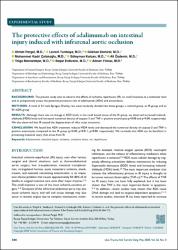The protective effects of adalimumab on intestinal injury induced with infrarenal aortic occlusion

Göster/
Erişim
info:eu-repo/semantics/openAccessTarih
2020Yazar
Pergel, AhmetTümkaya, Levent
Demiral, Gökhan
Çolakoğlu, Muhammet Kadri
Kalcan, Süleyman
Özdemir, Ali
Mercantepe, Tolga
Erdivanlı, Başar
Yılmaz, Adnan
Üst veri
Tüm öğe kaydını gösterKünye
Pergel, A., Tümkaya, L., Demiral, G., Çolakoğlu, M. K., Kalcan, S., Özdemir, A., Mercantepe, T., Erdivanlı, B., & Yılmaz, A. (2020). The protective effects of adalimumab on intestinal injury induced with infrarenal aortic occlusion. İnfrarenal aort oklüzyonu ile oluşan intestinal hasarında adalimumab'ın koruyucu etkisi. Ulusal travma ve acil cerrahi dergisi = Turkish journal of trauma & emergency surgery : TJTES, 26(3), 366–372. https://doi.org/10.14744/tjtes.2019.59607Özet
BACKGROUND: the present study aims to observe the effects of ischemia-reperfusion (IR) on small intestines at a molecular level and to prospectively assess the potential preventive role of adalimumab (ADA) and antioxidants. METHODS: A total of 24 male Sprague-Dawley rats were randomly divided into three groups-a control group, an IR group and an IR+ADA group. RESULTS: Although there was no change in SOD levels in the small bowel tissue of the IR group, we observed increased malondialdehyde (MDA) levels and increased numerical density of caspase-3 and TNF-alpha positive enterocytes p=0.00 and p=0.00, respectively). We also observed that IR caused the degeneration of villus crypt structures. CONCLUSION: We found that ADA treatment reduced MDA levels and decreased the numerical density of caspase-3 and TNF-a positive enterocytes compared to the IR group (p=0.00; p=0.011; p=0.00, respectively). We conclude that ADA can be beneficial in preventing intestinal injury that arises from IR.

















